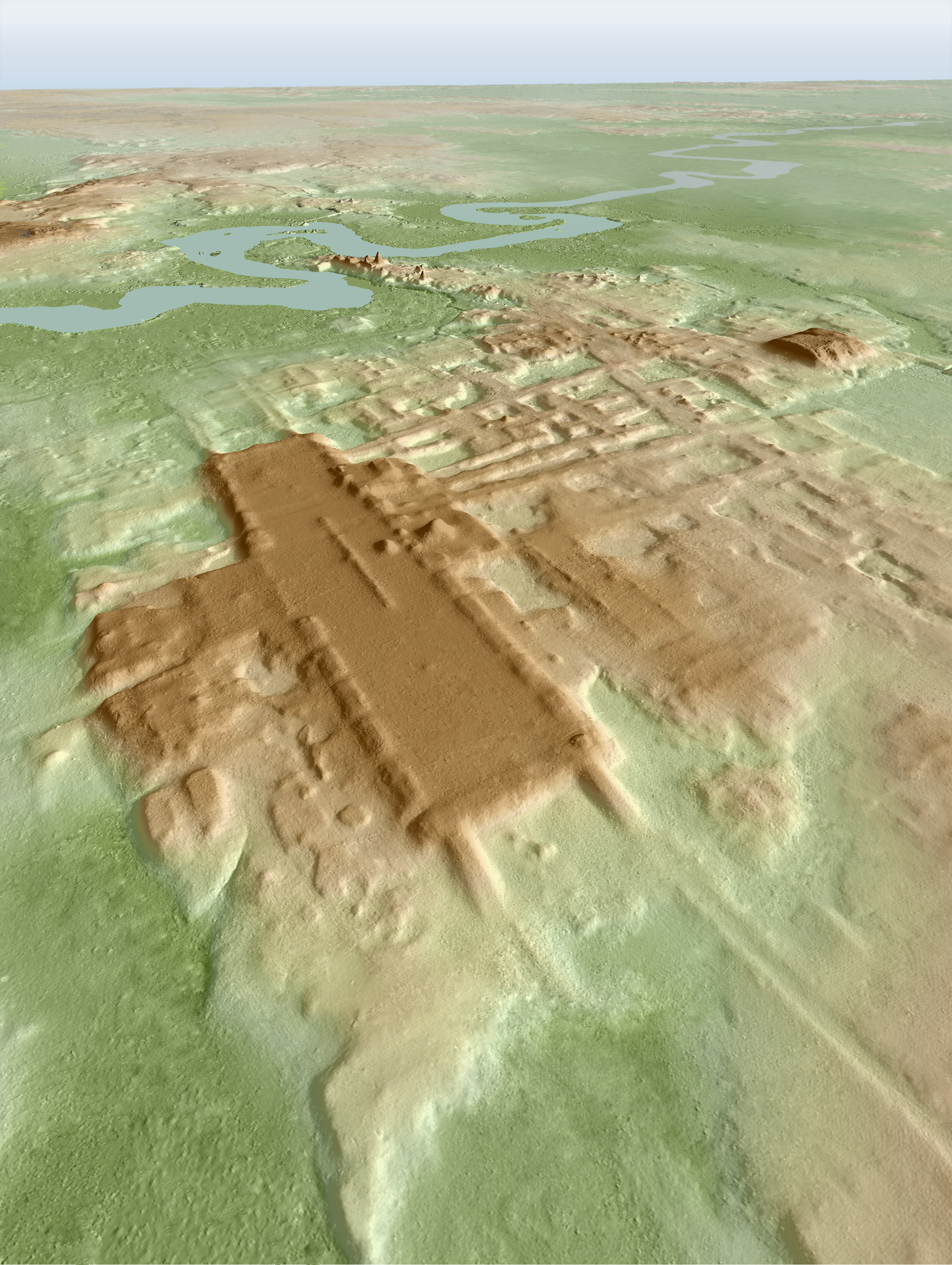The week's good news: June 4, 2020
It wasn't all bad!


- 1. Researchers discover largest and oldest Maya structure
- 2. Kenyan boy earns presidential award after creating hand-washing machine
- 3. California twin sisters graduate high school the top 2 in their class
- 4. Virginia runner strides down all 492 public streets in his town
- 5. 7-year-old plans special backyard prom for babysitter
A free daily email with the biggest news stories of the day – and the best features from TheWeek.com
You are now subscribed
Your newsletter sign-up was successful
1. Researchers discover largest and oldest Maya structure
Using a remote sensing method, scientists working in southern Mexico found an ancient structure that has a total volume exceeding Egypt's Great Pyramid of Giza. The discovery in Aguada Fénix is the largest and oldest-known structure built by the Maya civilization, Reuters reports. A rectangular elevated platform made of clay and earth, it was built between 1000 and 800 BC, is nearly a quarter-mile wide and nine-tenths of a mile long, and stood 33 to 50 feet high. Researchers used Light Detection and Ranging, or Lidar, to find the structure. This technique utilizes laser light and other data recorded by an aerial system to generate three-dimensional information about the surface of the Earth. University of Arizona archeologist Takeshi Inomata led the research, published Wednesday in Nature, and told Reuters researchers believe the structure was used "for special occasions, possibly tied to calendrical cycles."
2. Kenyan boy earns presidential award after creating hand-washing machine
Stephen Wamukota's ingenuity has earned him a presidential award. Wamukota, 9, lives in western Kenya, and received the honor after creating a wooden hand-washing machine that uses a foot pedal to dispense water so people can avoid touching surfaces amid the coronavirus pandemic. He started working on his invention after watching a television show about the virus, and has already made two hand-washing stations. His dad, James Wamukota, told BBC News he had purchased pieces of wood to make a window frame, "but when I came back home after work one day, I found that Stephen had made the machine. The concept was his and I helped tighten the machine. I'm very proud." On Monday, Wamukota and 67 other Kenyans received inaugural Presidential Order of Service, Uzalendo (Patriotic) Awards, with Wamukota the youngest winner. This made the budding inventor, who wants to be an engineer one day, feel "very happy."
The Week
Escape your echo chamber. Get the facts behind the news, plus analysis from multiple perspectives.

Sign up for The Week's Free Newsletters
From our morning news briefing to a weekly Good News Newsletter, get the best of The Week delivered directly to your inbox.
From our morning news briefing to a weekly Good News Newsletter, get the best of The Week delivered directly to your inbox.
3. California twin sisters graduate high school the top 2 in their class
Twin sisters Valerie and Vanessa Gonzalez have done almost everything together, including finishing high school at the top of their class. The 17-year-olds are set to graduate from Pacific High School in San Bernardino, California, this month. Valerie is valedictorian, completing her senior year with a 4.62 GPA, and Vanessa is right behind her — she has a GPA of 4.61, and will serve as salutatorian. "We definitely relied on each other," Vanessa told the San Bernardino Sun. "We would help each other on essays on how to explain main points. We studied together for tests." Combined, Valerie and Vanessa took 18 Advanced Placement classes, but also found time to participate in extracurricular activities. Their principal, Natalie Raymundo, told the Sun the sisters are "great examples of exactly what we hope for our students. They're well-rounded, have a lot of experience, and do their work with flair, with humility, and integrity."
4. Virginia runner strides down all 492 public streets in his town
Ty Stephenson found that the best way to explore his hometown was by using his own two feet. Stephenson, 19, lives in Blacksburg, Virginia. Last July, he became inspired by a man who ran on every public street in San Francisco, and decided to do the same in Blacksburg. Stephenson picked up a map, found there were 492 roads he could run, and hit the pavement, discovering beautiful views and hidden spots he never knew existed. At the end of the every run, Stephenson grabbed a yellow highlighter and marked the streets on his map. He finished his quest on May 17, after going on 60 runs and covering 314 miles. Stephenson learned that adventure can be found in your own backyard, no passport necessary. "I just think life's too short to wait for those places that are exotic or something when we have so many cool places so close to us," he told The Roanoke Times.
A free daily email with the biggest news stories of the day – and the best features from TheWeek.com
5. 7-year-old plans special backyard prom for babysitter
Dressed in his best suit and ready to dance, Curtis Rogers, 7, threw his babysitter a mini-prom she'll never forget. Because of the pandemic, Rachel Chapman, 17, of Raleigh, North Carolina, wasn't able to experience many senior activities, including prom. Rogers' mom, Elissa, told Good Morning America her son "absolutely adores" Chapman, and when he heard that her prom had been canceled, he didn't want her to miss out on the fun, deciding to plan one himself. Rogers picked out everything, from his dapper suit to the night's menu, which was comprised of food he used to eat with Chapman, like apples with peanut butter. During the prom, they safely kept their distance, sharing a meal and dancing from afar. Chapman, who hasn't been able to babysit Rogers since March, was "so surprised" by his thoughtfulness. "I had no idea he was going to go all out," she added. "It was very thoughtful and sweet."
Catherine Garcia has worked as a senior writer at The Week since 2014. Her writing and reporting have appeared in Entertainment Weekly, The New York Times, Wirecutter, NBC News and "The Book of Jezebel," among others. She's a graduate of the University of Redlands and the Columbia University Graduate School of Journalism.
-
 Political cartoons for February 22
Political cartoons for February 22Cartoons Sunday’s political cartoons include Black history month, bloodsuckers, and more
-
 The mystery of flight MH370
The mystery of flight MH370The Explainer In 2014, the passenger plane vanished without trace. Twelve years on, a new operation is under way to find the wreckage of the doomed airliner
-
 5 royally funny cartoons about the former prince Andrew’s arrest
5 royally funny cartoons about the former prince Andrew’s arrestCartoons Artists take on falling from grace, kingly manners, and more
-
 The week's good news: Sept. 21, 2023
The week's good news: Sept. 21, 2023It wasn't all bad!
-
 The week's good news: Sept. 14, 2023
The week's good news: Sept. 14, 2023It wasn't all bad!
-
 The week's good news: Sept. 7, 2023
The week's good news: Sept. 7, 2023feature It wasn't all bad!
-
 Lives transformed by swimming with Newfoundland dogs
Lives transformed by swimming with Newfoundland dogsfeature Good news stories from the past seven days
-
 The week's good news: August 31, 2023
The week's good news: August 31, 2023feature It wasn't all bad!
-
 The week's good news: August 17, 2023
The week's good news: August 17, 2023feature It wasn't all bad!
-
 Earring lost at sea returned to fisherman after 23 years
Earring lost at sea returned to fisherman after 23 yearsfeature Good news stories from the past seven days
-
 Farmer plants 1.2m sunflowers as present for his wife
Farmer plants 1.2m sunflowers as present for his wifefeature Good news stories from the past seven days
